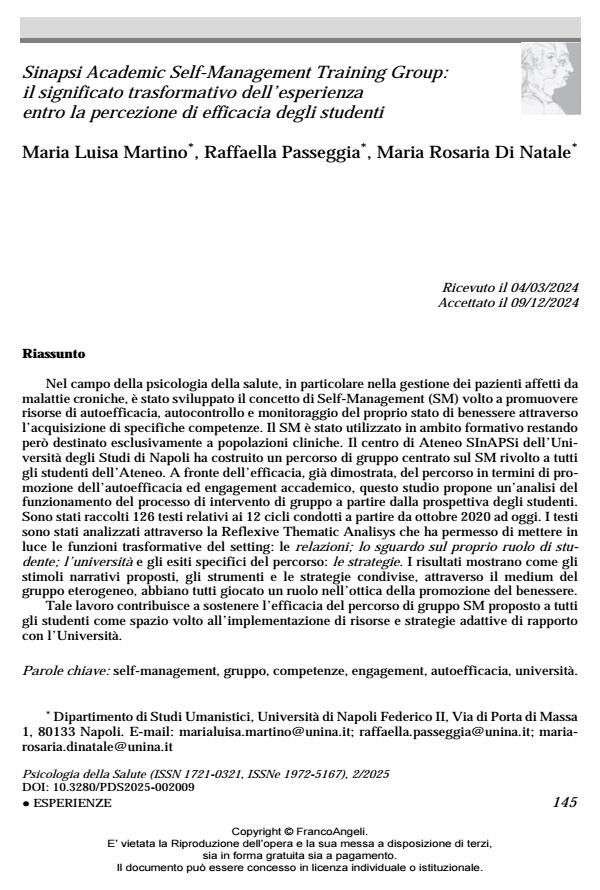Sinapsi Academic Self-Management Training Group: il significato trasformativo dell’esperienza entro la percezione di efficacia degli studenti
Titolo Rivista PSICOLOGIA DELLA SALUTE
Autori/Curatori Maria Luisa Martino, Raffaella Passeggia, Maria Rosaria Di Natale
Anno di pubblicazione 2025 Fascicolo 2025/2
Lingua Italiano Numero pagine 23 P. 145-167 Dimensione file 191 KB
DOI 10.3280/PDS2025-002009
Il DOI è il codice a barre della proprietà intellettuale: per saperne di più
clicca qui
Qui sotto puoi vedere in anteprima la prima pagina di questo articolo.
Se questo articolo ti interessa, lo puoi acquistare (e scaricare in formato pdf) seguendo le facili indicazioni per acquistare il download credit. Acquista Download Credits per scaricare questo Articolo in formato PDF

FrancoAngeli è membro della Publishers International Linking Association, Inc (PILA), associazione indipendente e non profit per facilitare (attraverso i servizi tecnologici implementati da CrossRef.org) l’accesso degli studiosi ai contenuti digitali nelle pubblicazioni professionali e scientifiche.
Nel campo della psicologia della salute, in particolare nella gestione dei pazienti affetti da malattie croniche, è stato sviluppato il concetto di Self-Management (SM) volto a promuovere risorse di autoefficacia, autocontrollo e monitoraggio del proprio stato di benessere attraverso l’acquisizione di specifiche competenze. Il SM è stato utilizzato in ambito formativo restando però destinato esclusivamente a popolazioni cliniche. Il centro di Ateneo SInAPSi dell’Università degli Studi di Napoli ha costruito un percorso di gruppo centrato sul SM rivolto a tutti gli studenti dell’Ateneo. A fronte dell’efficacia, già dimostrata, del percorso in termini di promozione dell’autoefficacia ed engagement accademico, questo studio propone un’analisi del funzionamento del processo di intervento di gruppo a partire dalla prospettiva degli studenti. Sono stati raccolti 126 testi relativi ai 12 cicli condotti a partire da ottobre 2020 ad oggi. I testi sono stati analizzati attraverso la Reflexive Thematic Analisys che ha permesso di mettere in luce le funzioni trasformative del setting: le relazioni; lo sguardo sul proprio ruolo di studente; l’università e gli esiti specifici del percorso: le strategie. I risultati mostrano come gli stimoli narrativi proposti, gli strumenti e le strategie condivise, attraverso il medium del gruppo eterogeneo, abbiano tutti giocato un ruolo nell’ottica della promozione del benessere. Tale lavoro contribuisce a sostenere l’efficacia del percorso di gruppo SM proposto a tutti gli studenti come spazio volto all’implementazione di risorse e strategie adattive di rapporto con l’Università. .
Parole chiave:self-management, gruppo, competenze, engagement, autoefficacia, università
Maria Luisa Martino, Raffaella Passeggia, Maria Rosaria Di Natale, Sinapsi Academic Self-Management Training Group: il significato trasformativo dell’esperienza entro la percezione di efficacia degli studenti in "PSICOLOGIA DELLA SALUTE" 2/2025, pp 145-167, DOI: 10.3280/PDS2025-002009